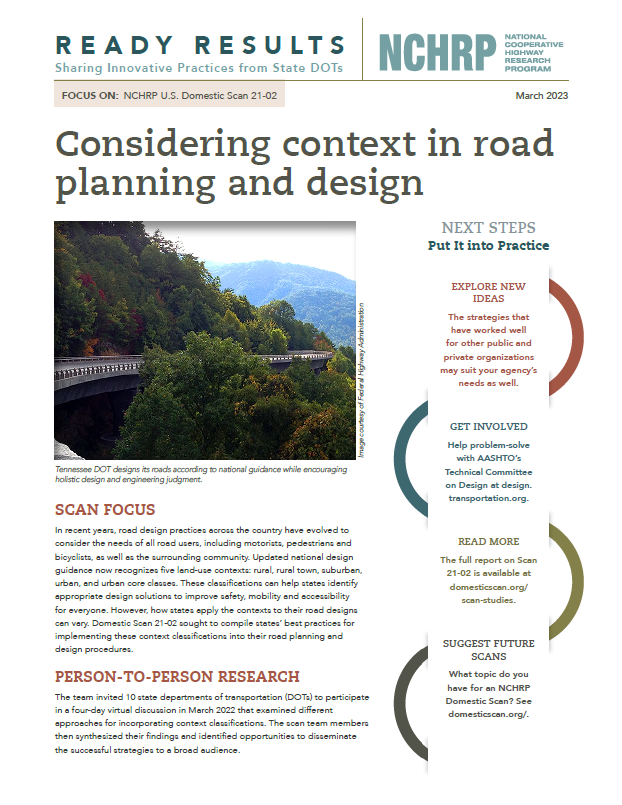Original Scope: The recently released 7th edition of the AASHTO “A Policy on Geometric Design of Highways and Streets (Green Book)” introduced the concept of context-based classification of roadways, intended to ensure that roadway designs are appropriate for the settings in which they are built and operated. The new guidance introduced a broader set of land-use context classifications (including rural, rural town, suburban, urban, and urban core) to better match design solutions to specific contexts and provide flexibility in developing project scopes with traditional functional classifications of roadways (local roads and streets, collectors, arterials, and freeways).
The Green Book does not present specific methodologies or parameters for applying the new context classifications. Some agencies seeking to take advantage of the flexibility made possible by these new classifications (for example Florida, New York, Connecticut, and the State of Washington) have implemented context classification in their own design guidance. The objective of the scan is to describe the experiences gained in such leading states and lessons learned that may be valuable to others who have not yet implemented context-based classification.
The scan is planned to be conducted as a virtual peer exchange (Type 4 Scan). In addition to providing an opportunity to document and compare how leading states have implemented Context-Based Classification within their jurisdictions, the scan should encourage a more uniform implementation of guidance across the country and allow for a common language to develop nationwide, promoting greater cooperation and sharing among practitioners. The scan also will provide information for the AASHTO Committee on Design to consider in the development of the next version of the Green Book.
Implementation and Impact
Following the scan workshop in March 2022, the scan team worked at the state and national levels to advance scan findings. Highlights of these activities include:
At the state level, scan findings were presented to the Utah State Transportation Conference, Tennessee Engineer’s Conference, TDOT-ACEC Partnering Conference, Ohio Transportation Engineering Conference, and the ACEC Roads and Streets Conference in Arizona.
At the national level, the scan team presented the scan outcomes at the TRB Annual Meeting to the Standing Committee on Performance Effects of Geometric Design and to the AASHTO Committee on Design.
Three scan team members are serving on the steering committee to develop the 8th Edition of the AASHTO Policy on Geometric Design of Highways and Streets (Green Book}. This new version will be different from the previous version in that it will not be organized by roadway classification, but rather by context.
Two scan team members are serving on the advisory committee for NCHRP 20-44 (51) Developing Training Materials to Implement Context Classifications. This project incorporated findings from this scan into its project scope and is due to be completed by March 2026.
Tennessee DOT has developed / published a project scoping guide, which will be fully implemented in April / May 2025. Standard drawings are being created to accompany the document. TDOT is utilizing the scoping guide to document the decision-making process throughout project delivery. This project has received an excellence award from the Tennessee chapter of the ACEC.
Maine DOT has incorporated lessons learned from this scan and added a Context Classifications layer to its online Public Map Viewer.
Utah, Arizona, and Ohio (among other states) continue to work with leadership to incorporate findings from this scan into their own state project delivery systems.
TRB hosted a webinar based on the outcomes of this scan entitled, Context-Based Classification in Roadway Planning and Design. To view the slides or obtain a copy of the recording, visit the webinar page on the National Academies website.
Scan Members
- Vaughn Nelson, Utah DOT, Scan Chair
- Angelo Papastamos, Utah DOT
- Brad Foley, Maine DOT
- James Kelley, Tennessee DOT
- Ali Hangul, Tennessee DOT
- Susan Keen, Virginia DOT
- David Holstein, Ohio DOT
- Michael DenBleyker, Arizona DOT
- Elizabeth Hilton, FHWA
- Kim Clark, Subject Matter Expert
Please login to access additional content for scan members only.


